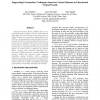151 search results - page 17 / 31 » How the JSDL can Exploit the Parallelism |
CW
2005
IEEE
14 years 1 months ago
2005
IEEE
Educational Virtual Worlds (EVWs) allow one to circumvent physical, safety, and cost constraints that often affect real-world training and learning scenarios. Virtual humans can i...
ISCA
1990
IEEE
13 years 11 months ago
1990
IEEE
An adaptive cache coherence mechanism exploits semantic information about the expected or observed access behavior of particular data objects. We contend that, in distributed shar...
HPCA
2008
IEEE
14 years 8 months ago
2008
IEEE
This paper describes a comprehensive approach for using the memory controller to improve DRAM energy efficiency and manage DRAM power. We make three contributions: (1) we describe...
ARC
2009
Springer
14 years 2 months ago
2009
Springer
Spiking Neural Networks (SNNs) model the biological functions of the human brain enabling neuro/computer scientists to investigate how arrays of neurons can be used to solve comput...
FPGA
2008
ACM
13 years 9 months ago
2008
ACM
It has been shown that FPGAs could outperform high-end microprocessors on floating-point computations thanks to massive parallelism. However, most previous studies re-implement in...

